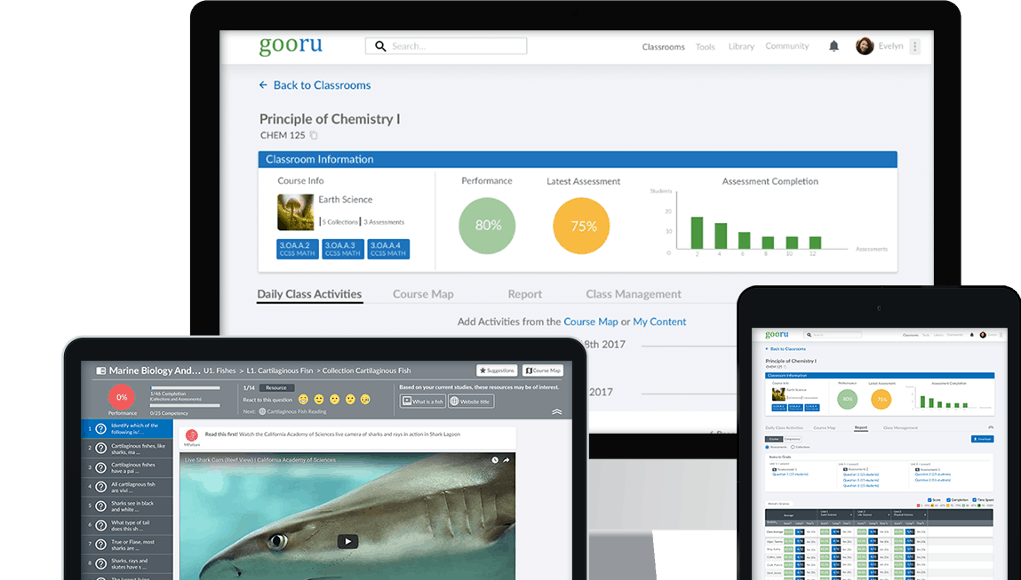Gooru Powers Personalized Learning With Open Content

The non-profit personalized learning platform Gooru (@Gooru) provides K-12 teachers and students with real-time assessment data and a catalog of free and open content designed to personalize the learning experience and support students in reaching their goals.
“We leave the content and the pedagogy to the experts and support their practice by providing a platform that brings these things together,” said Dr. Prasad Ram (Pram), who started Gooru as a “20 percent effort project” while at Google. After a year-long pilot in India that included 1,000 students across 25 classrooms, Pram subsequently left Google to develop Gooru with Amara Humphry, a Stanford design grad.
They formed Gooru as a nonprofit in 2011 to “honor the human right to education” and the initial vision was to create a search engine for learning. However, it has now evolved into what Pram describes as a “free community-led platform that empowers all teachers and students with quality learning resources and real-time data.”
Since our initial review, Gooru has developed its Learning Navigator product even further. Described as a “GPS for learning” tool that offers personalized pathways to help students reach their learning goals, it also allows teachers to facilitate formative assessments, assign content and track student progress.
 Steering the platform’s development is the Gooru Schools Collaborative–Riverside Unified, Santa Ana Unified, Val Verde Unified, Partnership to Uplift Community (PUC) Schools and Leadership Public Schools (LPS). The California districts and charter networks, with support from Schwab, Hewlett and SCE, have made K-12 learning open to all through Gooru.
Steering the platform’s development is the Gooru Schools Collaborative–Riverside Unified, Santa Ana Unified, Val Verde Unified, Partnership to Uplift Community (PUC) Schools and Leadership Public Schools (LPS). The California districts and charter networks, with support from Schwab, Hewlett and SCE, have made K-12 learning open to all through Gooru.
“It’s been very powerful, very exciting to see these schools come together and create a platform and support neighboring districts,” said Pram. Most districts using Gooru also have a commitment to Google apps and Chromebooks, and Pram says their intent is to support all devices.
In 2014, Gooru added an assessment and analytics system. To date, over a million questions have been contributed by teachers and counting. With an active community of teacher contributors, Gooru is focusing on making the highest-quality materials discoverable and dynamic. Looking forward, Pram sees an opportunity to provide insight so that educators and students can make informed choices with data.
Gooru also enables students to track their progress against standards but it’s not a learning management system (LMS). Pram sees LMS as becoming massive enterprise systems. “Gooru wants to facilitate the learning space, not attendance, homework management and the gradebook,” he said.
Pram is quick to recall Brian Greenberg’s comment, “We’re not one algorithm away from educational transformation. This is not like transactions on Amazon. Interactions between students, teachers and communities matter.”
But on the path forward, he is audacious. “Airbnb owns lodging experience, Uber owns transportation experience without having to create the infrastructure for lodging or transportation. We want an open platform where everyone can innovate on learning experiences.”
This post is an update to this original blog.
For more, see:
- Getting Smart on Next-Gen Learning Platforms
- Beyond the LMS: What Next-Gen Learning Platforms Should Do
- Impact at Scale: The Learning Platform Series
Stay in-the-know with all things EdTech and innovations in learning by signing up to receive the weekly Smart Update.





0 Comments
Leave a Comment
Your email address will not be published. All fields are required.